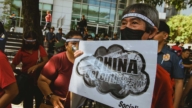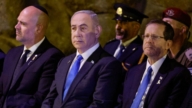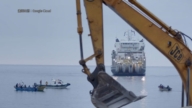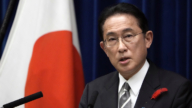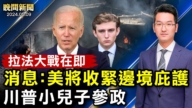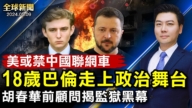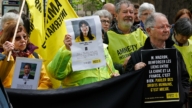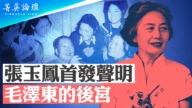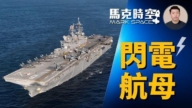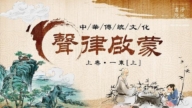【新唐人2014年04月25日訊】美國總統歐巴馬正在日本訪問,這是他23號到29號出訪亞太四國的第一站。由於他在動身前高調重申了《美日安保條約》,外界普遍認為,美國打算聯合亞太國家,抵制中共違反國際法的行動。讓我們一起去看看專家們的分析。
歐巴馬這次亞洲之行將訪問日本、韓國、菲律賓和馬來西亞四國。23號,他已經抵達日本首都東京,24號,他會見了日本首相安倍晉三。據報導,亞太地區的和平與安全問題是歐巴馬此行的重點。
旅美政論家伍凡:「他的目地既要保護日本,又要抑制中國不要動武,再怎麼爭吵都可以但不要動武,因為一動武,美國非要介入,美國不願意介入。所以最好的辦法就是維持現狀,遵守國際法。給日本人吃個定心丸,但是也不激怒北京。中共想在亞太把美國擠出去,就是中日之間爭龍頭。」
在歐巴馬訪問亞太四國前兩週,4月8號到10號,美國國防部長哈格爾訪問了北京。哈格爾在北京的公開演講中説:他認為應該通過三個渠道發展新型軍事關係。首先是保持持續和實質性對話,其次是在兩國利益一致的領域進行具體的務實合作,最後是努力通過開放和相互溝通管理競爭和分歧。
伍凡:「歐巴馬這次到亞洲來,他是要想把四個國家——日本、韓國、菲律賓、馬來西亞,拉到他那一邊,共同抵抗中國(共)。但是中共也在用利益的手段拉韓國和拉馬來西亞,他知道拉不動菲律賓、日本,它正在做。」
歐巴馬在啟程飛往日本前,接受了日本《讀賣新聞》的專訪。他表示,美國反對任何國家單方面試圖損害日本對有爭議島嶼的管理。他還強調,依照《美日安保條約》,如果日本受到攻擊,美國有義務提供防禦。他還呼籲各方通過外交和溝通而不是脅迫或恐嚇來解決爭議。
旅美新唐人時事評論員藍述:「這一次歐巴馬特別突出的就是:日美安保條約是美國太平洋政策的基礎,從地理位置上來講,日本他的戰略地位非常重要,是整個自由世界和極權世界互相之間對峙的前哨。保證了日本的安全、加強美日之間的關係,最根本維護的就是自由世界的價值。」
東京「上智大學」政治學教授中野浩一(Koichi Nakano)也判斷:「美國會留在這裡,並且有濃厚的興趣和這些國家一起應付中國。」
中共外交部23號反駁了美國的態度,大陸媒體還對美國提出警告。
藍述:「目前中共與中國民眾之間的矛盾到了前所未有尖銳的程度,在這種情況下,炒作釣魚島的問題,對中共打民族主義這張牌,維持中國社會的穩定有一定的利用價值。西方任何不大謹慎的行為,很可能就會成為中共轉移視線的靶子,所以也都很謹慎。」
美國參議院外交關係委員會上週發佈的一份報告說,美國應投入更多資金和努力,加強亞太地區的聯盟。而且「一個成功的再平衡戰略,必須強調這樣一個戰略信息:該政策代表著美國將持久致力於該地區,向我們的夥伴們確保我們將長期這樣做」。
採訪編輯/唐音 後製/陳建銘
Is Obama Joining Asia Allies to Stand Against Chinese Communist Party?
U.S. President Barack Obama is visiting Japan.
This is the first stop in his four-nation
Asia visit from April 23 to 29.
His reiteration of the US-Japan Security Treaty is
interpreted that the US is forming allies in the region.
These relationships stand against the Chinese
Communist Party intention’s to break international laws.
Let’s take a look at our experts analysis.
President Obama’s four-nation tour includes
Japan, South Korea, Philippines and Malaysia.
He met with Japanese Prime Minister Shinzo Abe on April 24.
It is reported that peace and security in the
Asia-Pacific region is the focus of Obama’s trip.
Wu Fan, political commentator: “His purpose
is to protect Japan and restrain the Chinese
Communist regime from attacking in the region.
The US has to intervene if conflict
erupts, but no one wants a war.
Therefore, it would be desirable to maintain a status
quo. It attempts to soothe Japan without irritating Beijing.
The CCP is anxious to compete for a leading
role with Japan, by pushing the US away."
U.S. Secretary of Defense Chuck Hagel
visited Beijing between April 8 and 10.
This was two weeks before Obama’s four-nation visit.
Hagel said in a public speech in Beijing that
to, develop a new model of military-to-military
relations, the U.S. believes its approach should
be to build a sustained and substantive dialogue.
This is to deepen practical cooperation
in areas of common interests.
It is to manage competition and manage
differences through openness and communication.
Wu Fan: “Obama’s Asia trip is to unite the
four countries – Japan, Korea, The Philippines
and Malaysia in order to resist China together.
However, China is trying to connect with Malaysia
and South Korea through economic benefits.
It knows that it can’t attract
The Philippines and Japan."
Before departing, Obama told Japan’s Yomiuri Shimbun
that the United States opposes any unilateral attempts
to undermine Japan’s administration of these islands.
He also stressed that in accordance with the
US-Japan Security Treaty, if Japan is attacked,
the United States is obliged to provide defense.
He insisted that, disputes need to be resolved through
dialogue and diplomacy, not intimidation and coercion.
Lan Su, NTD commentator: “Obama’s
visit is prominent for this reason.
The US-Japan Security Treaty is the
foundation of the U.S. Pacific policies.
Geographically speaking, Japan’s
strategic position is very important.
It is an outpost between the entire
free world and totalitarianism.
For the security of Japan, and to strengthen
US-Japan relations, the US has maintained
the most fundamental values of the free world."
Associated Press reported that, “America is here to stay.
It is going to keep a strong interest in dealing with China
together with those countries", said Koichi Nakano, a
political science professor at Tokyo’s Sophia University.
China’s foreign ministry said on
Wednesday that it opposed the US stance.
State-run media also commented
with warnings aimed towards the US.
Lan Su: “The conflict between the CCP and the
Chinese people has reached an unprecedented level.
The hype over the Diaoyu Islands issue has a certain
value to the CCP for ‘maintaining it’s stability’ in society.
Any acts of aggression could become the
target of the CCP to divert its domestic tension.
That’s why every country has been careful."
AP reported on a report released last week by U.S. Senate
Foreign Relations Committee, which urged that more effort
and money be devoted to upgrading Asia-Pacific alliances.
“A successful rebalance must underscore the
strategic message that the policy represents an
enduring U.S. commitment to the region, assuring
our partners that we are in it for the long haul."
Interview & Edit/Tang Yin Post-Production/Chen Jianming


